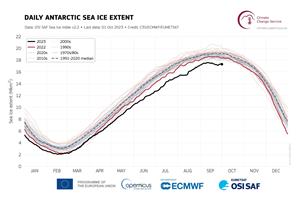
According to the latest report from the European agency Copernicus, sea ice extent in Antarctica is at its lowest level ever. (Source: Copernicus Climate Change Service/ECMWF/EUMETSAT)
Nelly Guidici – IJL – Réseau.Presse
The European Copernicus Agency announced on October 5, 2023 that the extent of sea ice in Antarctica had reached unprecedented levels.
After reaching a historic low in February 2023 and remaining relatively close to the already low values of 2022 in March and early April, “unusual behavior” in sea ice extent began in the spring, with data falling below the previous record minimum values for this time of year.
In September, the measured monthly expansion was 9% below average.
Same scenario in the Arctic
Data collected in the Arctic Ocean shows that the north is also bearing the brunt of the effects of global warming. In the Pacific part of the Arctic Ocean, sea ice concentrations were below average, while an area with above-average concentrations remained along the northern coast of Siberia.
Sea ice extent in the Arctic is 18% below average.
A study published June 6, 2023 in the journal Nature predicted a complete disappearance of summer ice in the Arctic and a more rapid emergence of an ice-free Arctic within a decade.
The study, titled “Observationally Constrained Projections of an Ice-Free Arctic, Even Under a Low Emissions Scenario,” was co-led by the Canadian Center for Climate Modeling and Analysis at the University of Victoria in Colombia. -British.
“In all scenarios considered, we predict an ice-free Arctic in September. These results highlight the profound impact of greenhouse gas emissions on the Arctic. “Our results show the importance of planning and adapting to an ice-free Arctic for part of the year in the near future,” this document says in particular.

